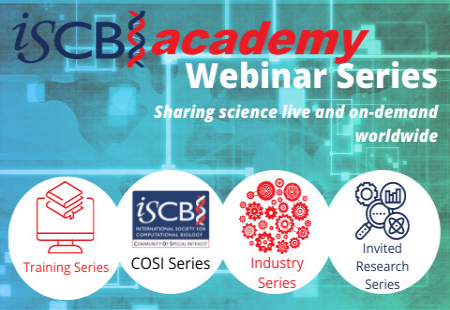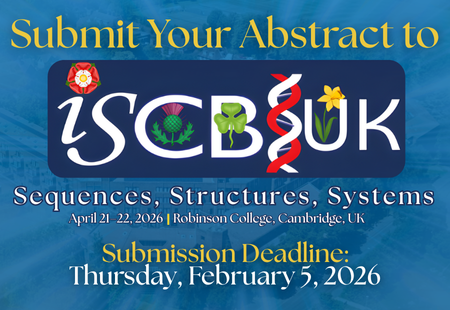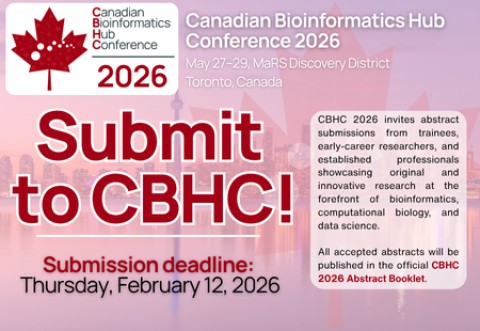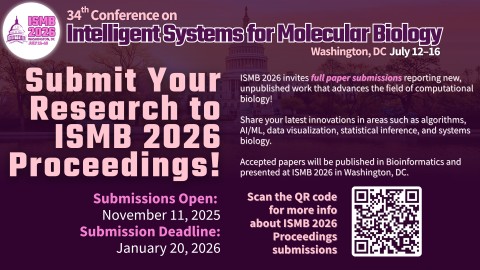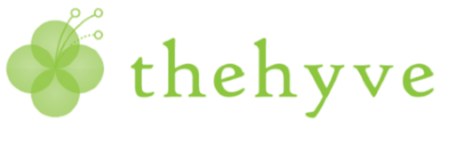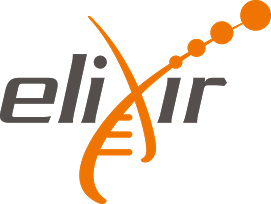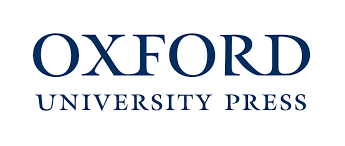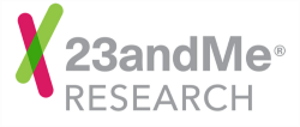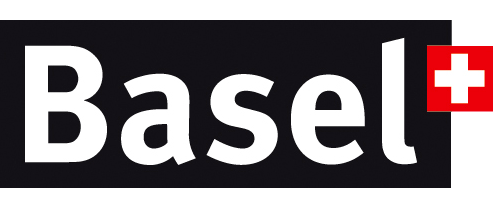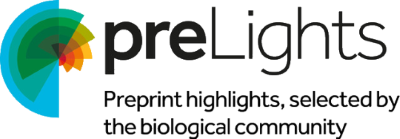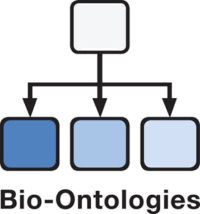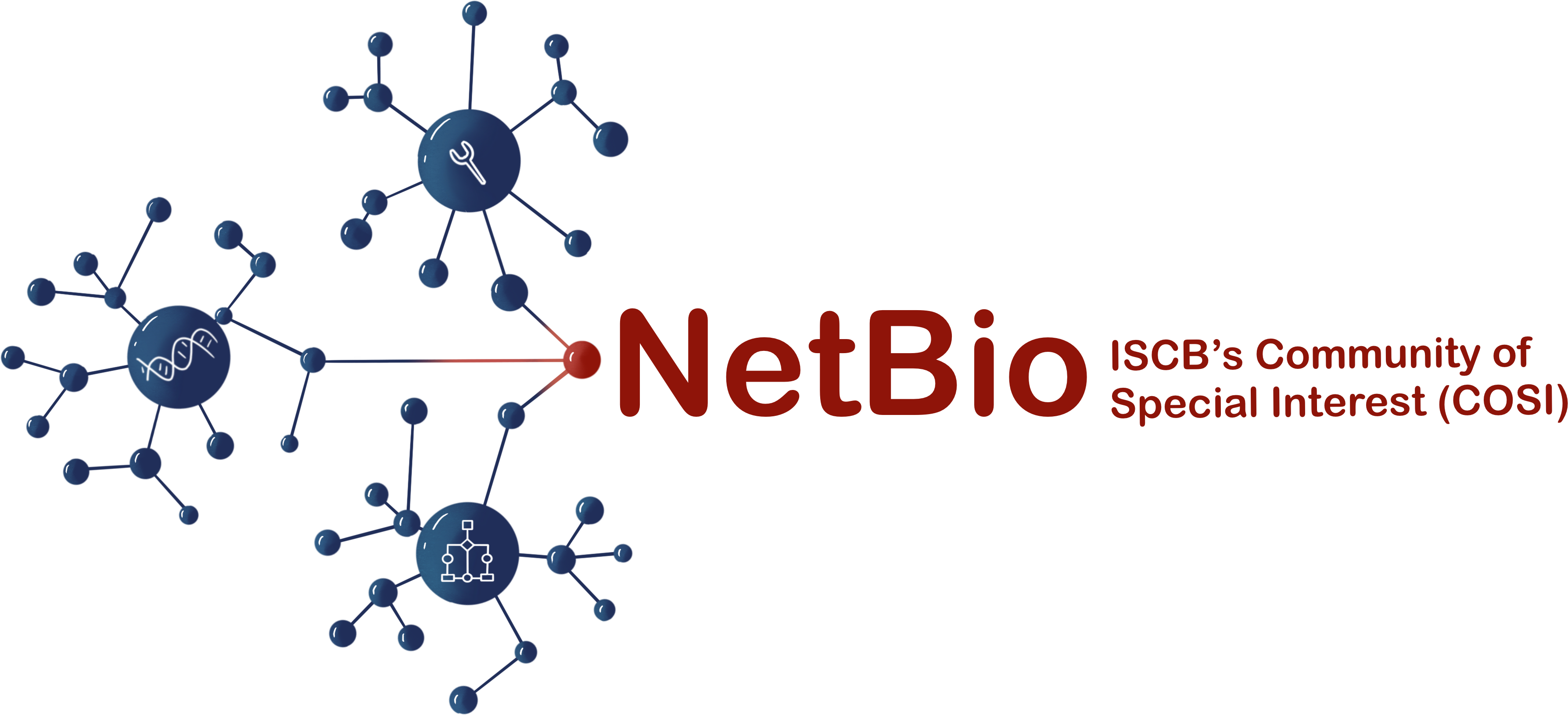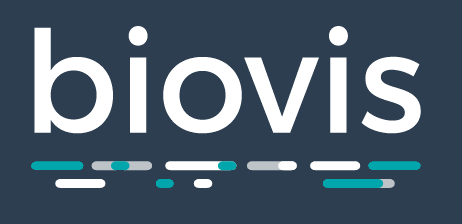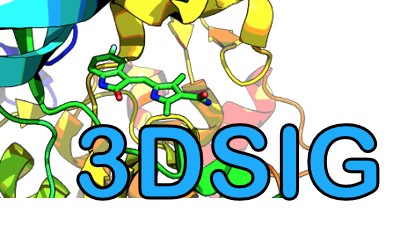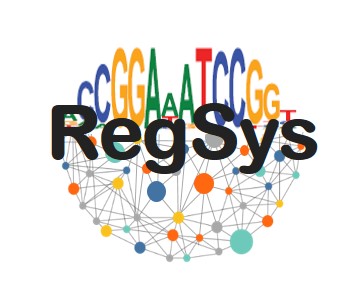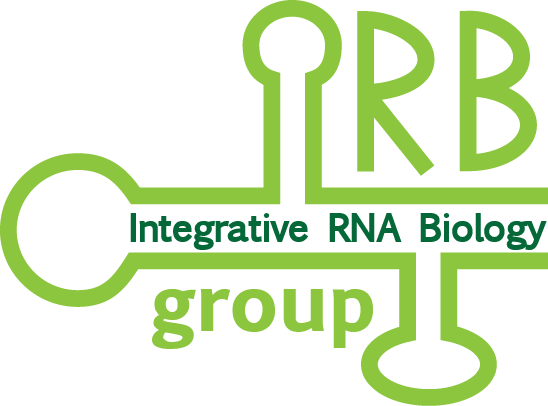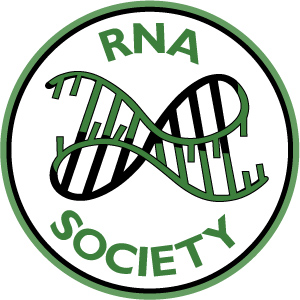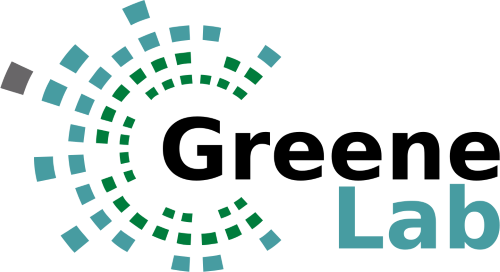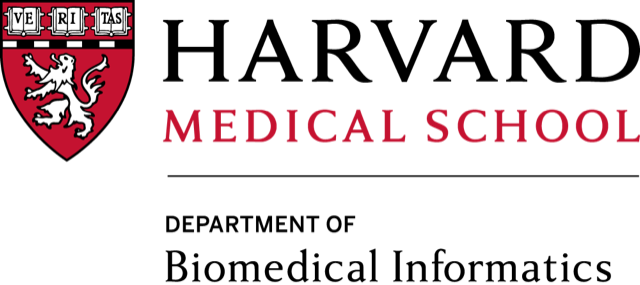Studies of Phenotypes and Clinical Applications
(COSIs within this area include: Bio-Ontologies, BioVis, CAMDA, Function, HiTSeq, MLCSB, NetBio, RNA, TransMed, VarI)
Chairs:
Sara Mostafavi, University of British Columbia, Canada
Venkata Satagopam, University of Luxembourg
3DSIG focuses on structural bioinformatics and computational biophysics. It is impossible to fully understand biological systems without understanding the 3D structure of their constituting parts and their interactions. As such the topics relevant for 3DSIG are wide and include, but are not restricted to Structure-based drug discovery including polypharmacology and network pharmacology; Structure representation, classification and prediction; Structure-based function prediction; Docking, analysis, prediction and simulation of biomolecular interactions such as protein-protein, protein-ligand and protein-nucleic-acid; Protein dynamics and disorder; Evolution studied through structures; Application of structure to systems biology; Macromolecular assemblies; Structural genomics; 3D databases and data mining; Molecular visualization; Relevant methods of structure determination particularly hybrid methods; Prediction and analysis of protein domains; Membrane protein structure analysis and prediction; The structural basis of immunology.
Keywords: Drug-discovery; Structure representation/classification/prediction; Structural basis of macromolecular function; Prediction and simulation of biomolecular interactions; Dynamics of biological macromolecules; Evolution studied through structures; Structural systems biology/pharmacology; 3D visualisation/data mining/databases; Structure-based protein engineering; Structural basis of human diseases
|
Computational approaches to the study of phenotypes at cellular and organismal levels, including disease predisposition, progression, and treatment; considering multi-omic, imaging and clinical data. |
|
Comparative and Functional Genomics
(COSIs within this area include: Bio-Ontologies, BioVis, Evolution and Comparative Genomics, Function, HiTSeq, MICROBIOME, MLCSB, NetBio, RegSys, RNA)
Chairs:
Can Alkan, Bilkent University, Turkey
Carl Kingsford, Carnegie Mellon University, United States
Bio-Ontologies Special Interest Group covers the latest and most innovative research in the application of ontologies and more generally the organization, presentation and dissemination of knowledge in biomedicine and the life sciences.
Keywords: Ontology; Knowledge representation; Data integration; Automated reasoning; Text mining: Machine learning; Biocuration; Semantic web; Deep phenotyping; Learning health system
|
Genome structure and function across species or strains; genome assembly, genome organization, and annotation; epigenetics. |
Bioinformatics Education
(COSIs within this area include: Education, MICROBIOME)
Chair: Anne Rosenwald, Georgetown, United States
The BioVis aims to educate, inspire, and engage bioinformatics and biology researchers in state-of-the-art visualization research and visualization researchers in problems in biological data visualization. The rapid adoption of data-intensive biology approaches creates enormous challenges for computational visualization techniques, which are needed to enable researchers to gain insight from their large and highly complex data sets.
Keywords:Biological data visualization; Visual data analysis; Visualization tools and libraries; Usability of visualization, genome and sequence data visualization; Network and pathway visualization; Multivariate data visualization; Imaging data visualization; Workflow and process visualization; Metadata visualization
|
Systematic examination and analysis of learning models, outcomes, and educational programs. |
Genomic Variation Analysis
(COSIs within this area include: BioVis, Function, HiTSeq, MICROBIOME, MLCSB, NetBio, RegSys, RNA, TransMed, VarI)
Chairs:
Martin Kircher, Berlin Institute of Health, Germany
Sriram Sankararaman, UCLA, United States
The Critical Assessment of Massive Data Analysis (CAMDA) sessions highlight and compare the latest methods and results in an international data analysis contest, with this year's topics including: (1) a cancer data-integration challenge for 500 children patients (FDA SEQC), (2) a meta-genomics challenge comparing swabs from subway stations in multiple cities (MetaSUB), and (3) a meta-genomics signal level challenge in Oxford Nanopore 'wiggle space'.
Keywords: International data analysis contest; Community wide experiment; Critical assessment of massive data analysis; Meta-genomics, cancer, data integration, gene expression, genomic deletions and duplications; Next-generation sequencing / RNA-seq, microarrays
|
Detection, qualification, and annotation of genomic variants and their structural and functional effects, and clinical or pharmaco-relevant applications. |
Bioinformatics of Microbes and Microbiomes
(COSIs within this area include: BioVis, CAMDA, HiTSeq, MICROBIOME, NetBio)
Chairs:
Curtis Huttenhower, Harvard University, United States
Yuzhen Ye, Indiana University, United States
Function COSI brings together computational biologists, experimental biologists, biocurators, and others who are dealing with the important problem of gene and gene product function prediction, to share ideas and create collaborations. Also, we are conducting a multi-year Critical Assessment of protein Function Annotation, or CAFA, experiment.
Keywords: Protein function; Ontologies; Machine learning; Computational challenge; Annotation
|
Computational methods and algorithms for studying microbial organisms, viruses, and their communities from omics and marker data. |
Population Genomics and Molecular Evolution
(COSIs within this area include: BioVis, Evolution and Comparative Genomics, Function, HiTSeq, MICROBIOME, MLCSB, RNA, VarI)
Chairs:
Christophe Dessimoz, University of Lausanne, Switzerland
Dannie Durand, Carnegie Mellon University, United States
HiTSeq is a special interest group devoted to the latest advances in computational techniques for the analysis of high-throughput sequencing (HTS) data.
Sessions will be devoted to discussing the latest advances in computational techniques for the analysis of high-throughput sequencing (HTS) datasets and will provide a forum for in-depth presentations of the methods and discussions among the academic and industry scientists working in this field. We seek contributions on any topic involving HTS data analysis including: genome assembly and haplotype phasing; transcriptome analysis; genetics and epigenetics variation; metagenomics and microbiome analysis; and new HTS platform data analysis (e.g. synthetic reads, long reads, nanopore). In addition to general sessions, we propose to have two specialized sessions to focus on current hot topics: a) long sequencing and mapping techniques, b) single cell sequencing applications, c) non-linear genome representations. Both of these topics have generated an enormous amount of interest recently.
Keywords: High-throughput sequencing; NGS; Algorithms; Read mapping; Data structures, Variant calling; DNA sequencing; RNA-seq; Single cell; Precision medicine
|
Algorithms for phylogeny estimation and modelling variation and change under the influence of evolutionary processes. |
|
Macromolecular Sequence, Structure, and Function
(COSIs within this area include: Bio-Ontologies, BioVis, CompMS, Evolution and Comparative Genomics, Function, MLCSB, RegSys, RNA, VarI)
Chairs:
Lenore Cowen, Tufts University, United States
Jérôme Waldispühl, McGill University, Canada
This RNA COSI covers the full range of research topics in the field of RNA Biology, from computational and high-throughput experimental methods development to their application in different aspects of RNA processing, structure, and function. Focusing on two major areas: (1) the development of computational and high-throughput experimental methods, and (2) the application of such methods to break new grounds in the study of RNA biology and disease, meshing together different aspects of Computational RNA Biology, and promoting cross-disciplinary collaborative research.
Keywords: Transcriptomics; RNA processing; Post-transcriptional regulation; Non-coding RNA; RNA 2D/3D structure, alternative splicing, alternative polyadenylation; RNA editing translation degradation and localization; Protein-RNA interactions; Genetic variants effect on RNA processing; RNA and disease
|
Analysis and annotation of DNA, RNA, and proteins to predict, characterize, and understand their structure, function, and evolution; omics data analysis to characterize form, abundance, and function of biological macromolecules. |
Systems Biology and Networks
(COSIs within this area include: Bio-Ontologies, BioVis, Function, MICROBIOME, MLCSB, NetBio, RegSys, TransMed)
Chairs:
Sushmita Roy, University of Wisconsin, United States
Roded Sharan, Tel-Aviv University, Israel
Network Biology covers new developments across this important and still burgeoning field; focusing on two major areas: (1) the development of network-related tools and resources, and (2) the application of network analysis and visualization in the study of biology and medicine. The session will provide a unique interface between tool developers and users in the field of network biology, and will bring into focus the current state of the field, its future promise and how to get there.
Keywords: Molecular networks; Molecular interactions; Network analysis; Network visualization; Network alignment; Network reconstruction; Heterogeneous networks; Diagnostic networks,: Network tools, Network databases
|
Emergent properties and complex multi-component interactions within biological systems, considering genomic, proteomic, metabolomic, and other -omic data; gene regulation and circuit design. |
|
Genome Privacy and Security
(COSIs within this area include: HiTSeq, TransMed)
Chair: Haixu Tang, Indiana University, United States
Regulatory genomics involves the study of the genomic "control system," which determines how, when and where to activate the "blueprint" encoded in the genome. Regulatory genomics is the topic of much research activity worldwide. RegGenSIG focuses on bioinformatics for regulatory genomics and will foster a collaborative community wherein scientists convene to solve difficult research problems in all areas of computational regulatory genomics.
Keywords and phrases: Gene regulation; ChIP-seq, RNA-seq, ATAC-seq; Transcription factors; Enhancers; Chromatin; Gene promoters; Regulatory elements; Epigenetics; Regulatory motifs and modules; Epigenomics and chromatin state; Alternative splicing; Pathway analysis; Non-coding RNAs; Regulatory networks; Co-transcriptional, post-transcriptional, and translational regulation; Genetic, molecular, and phenotypic variation and human disease; The role of non-coding mutations in disease; DNA shape; Single-cell transcriptomics (and other single cell assays); 3D genomics (e.g., Hi-C and ChIA-PET); Epitranscriptomics; Regulatory evolution or comparative regulatory genomics
|
Methods related to the protection of individualized genomic and medical information; privacy models. |
|
General Computational Biology*
Chairs:
Olga Vitek, Northeastern University, United States
Daisuke Kihara, Purdue University, United States
*If all other areas listed above are insufficiently descriptive of your work, please submit to General Computational Biology. Please note that the submissions in this area are likely to be moved, subject to chairs’ considerations.
SysMod aims to create a forum for systems modelers and bioinformaticians to discuss common research questions and methods. Focusing on the conjoint use of mathematical modeling and bioinformatics to understand biological systems functions and dysfunctions. SysMod is open to the full range of methods used in systems modeling, including qualitative and quantitative modeling, dynamical and steady-state modeling, as well all applications of systems modeling including basic science, bioengineering, and medicine.
Key words and phrases: Mathematical model; Numerical simulations; Whole genome metabolic models; Signalling pathways; Systems medicine; Quantitative systems pharmacology; Data and model integration; Model parametrization; Multi-scale models; Synthetic biology
|
Novel techniques in emerging areas of computational biology, including intersections with other fields. Text mining topics will be included in the General Computational Biology area.
|

